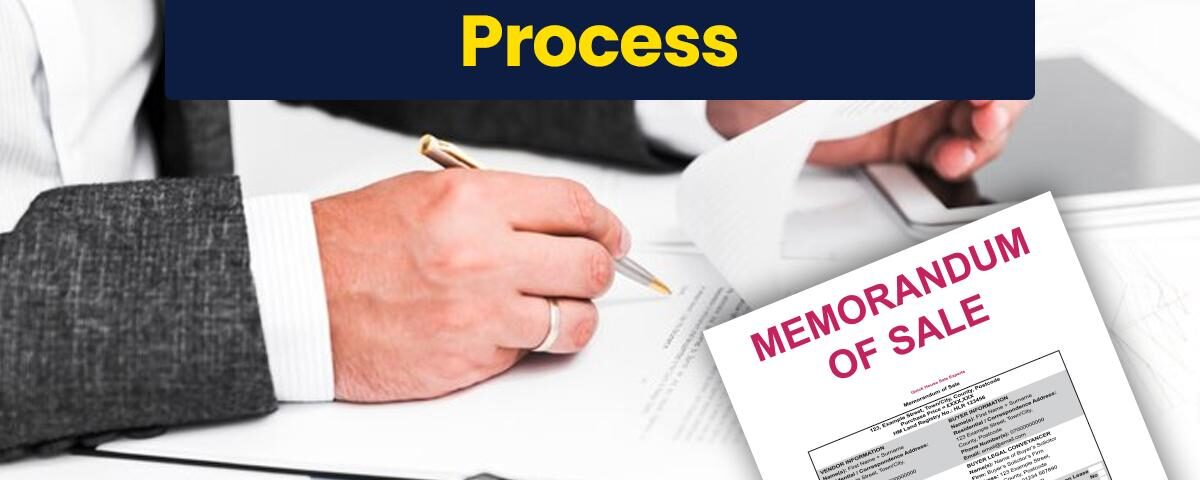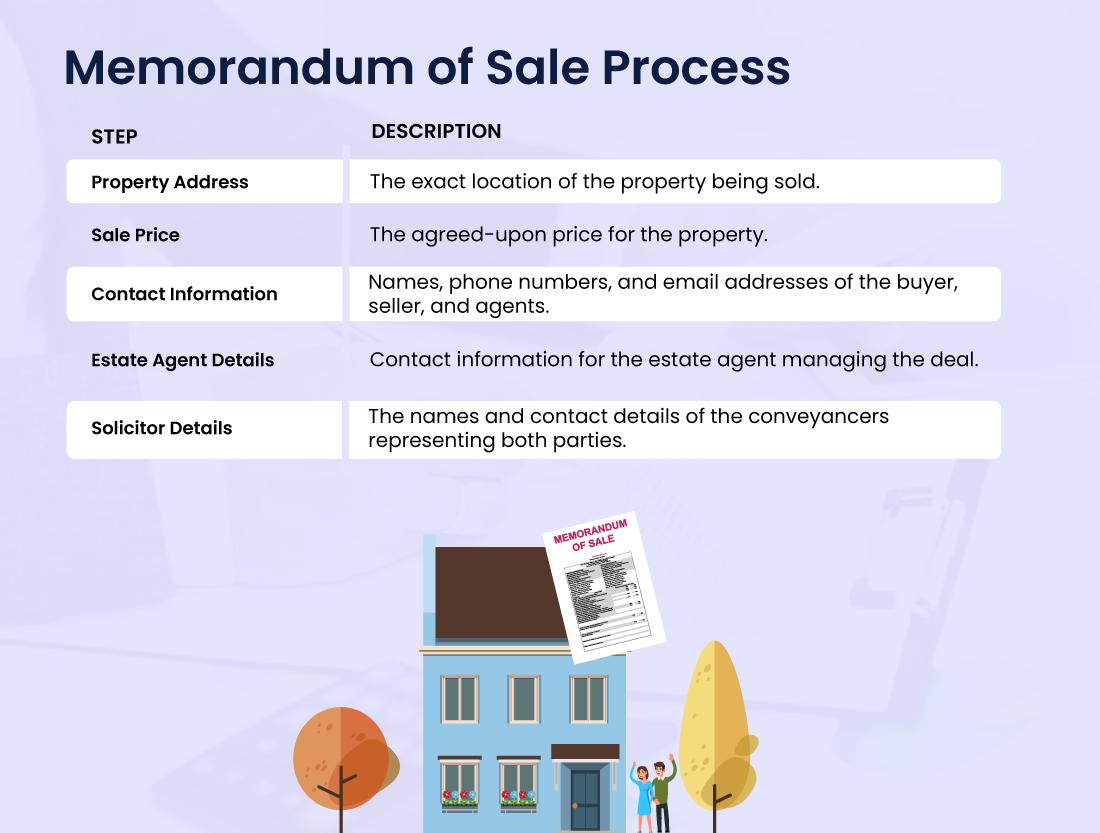
VAT on Margin Scheme
November 30, 2024
VAT on Commercial Property
December 2, 2024What Is a Memorandum of Sale for Smooth Property Transactions?

Buying or selling property is a big choice, but it doesn’t have to be hard. From complex legal terms to a mountain of paperwork, it’s easy to feel lost. However, One document that plays a crucial role in formalizing the property sale is the memorandum of sale.
It may seem like just another formality, but it is essential for ensuring a smooth transaction between the buyer and seller. In this guide, we’ll walk you through everything you need to know about the memorandum of sale, including what it is, why it’s important, and how you can navigate the process with ease.
Whether you’re a first-time homebuyer, an investor, or selling your property, understanding this step can help you manage the transaction like a pro.

Table of Contents
What Is a Memorandum of Sale?
The memorandum of sale is a document that outlines the key details of a property transaction once the buyer and seller have agreed on the sale.
Although it’s not a legally binding contract, it provides clarity and sets the foundation for the next steps in the process.
Memorandum of Sale Process
| Step | Description | Notes to Consider |
| Purpose | Records align sale details, including price, contacts, and completion dates. | Typically drafted by estate agents. |
| Buyer Checks | Verifies the buyer’s financial readiness, including mortgage and deposit proof. | Prevents delays due to unverified funds. |
| Conveyancing | Legal process to transfer ownership, including title checks and contract drafting. | Handled by solicitors. |
| Searches | Uncovers risks like environmental hazards or local planning issues. | Helps prevent future issues. |
| Survey Types | Includes general, homebuyer’s, or structural surveys to assess property condition. | Choose based on the property’s age and type. |
| Exchange of Contracts | The final, legally binding agreement between buyer and seller. | Completed after survey and title verification. |
| Completion Timeline | The time it takes to finalize the transaction, ranging from days to months. | Efficiency depends on all parties involved. |
Prepared by the estate agent or auctioneer, this document helps facilitate the process, allowing solicitors to begin drafting contracts and initiating legal procedures.
Why Is the Memorandum of Sale Important?
The Memorandum of Sale plays a key role in the property transaction process.
It serves as a formal confirmation of the agreement between the buyer and seller, ensuring all parties are on the same page.
Here are 3 reasons why it’s so important:
- Clarifies the Agreement: It ensures all parties are aligned—buyer, seller, agent, and solicitor.
- Speeds Up Communication: It connects everyone, from buyers to lenders, streamlining the process.
- Starts Legal Steps: It gives solicitors the go-ahead to draft contracts and prepare for the exchange.
If you manage multiple properties, mastering this document is key to smooth, efficient transactions.
What Happens After the Memorandum of Sale?
Once the memorandum of sale has been issued, the hard work begins.
This document marks the formal agreement between the buyer and seller, but there are still important tasks to complete before the deal is finalized.
Here’s a breakdown of what happens next:
1. Financial Verification
The buyer’s financial readiness must be confirmed to ensure they can move forward. This typically involves:
- Mortgage Approval: The buyer requires a Decision or Agreement in Principle (DIP/AIP) from their lender.
- Deposit Source Checks: Verification of funds is required to comply with anti-money laundering laws.
For investors, keeping track of VAT accounting and ensuring compliance with tax regulations can simplify this process.
Check out our article on VAT thresholds for more information.
2. Conveyancing
Conveyancing refers to the legal process that transfers property ownership from seller to buyer. Both parties must hire solicitors to:
- Draft the contracts
- Review the property’s title and lease (if applicable)
- Complete necessary local authority and environmental searches
Efficient conveyancing can save time, so regular communication with your solicitor is key to avoiding delays.
3. Property Searches
Property searches are crucial for identifying potential issues with the property or its environment.. The main types include:
- Local Authority Searches: Checks for planning permissions, road schemes, and building regulations.
- Environmental Searches: Identifies risks like flooding or contamination.
- Water and Drainage Searches: Ensures that there are no issues with water supply or drainage rights.
As a landlord or investor, knowing how to evaluate these searches is key to protecting your investment.
For a deeper understanding of managing tax-related matters during property transactions, check out our Tax Consultancy Services.
4. Surveys
A property survey evaluates the condition of the home and uncovers any potential problems. There are several types of surveys, each suited to different needs:
- Condition Report: A basic survey that highlights any immediate concerns.
- Homebuyers Report: A more detailed check that focuses on structural problems and hidden damages.
- Full Structural Survey: A detailed survey, ideal for aging properties or those with major issues.
Choosing the right survey is crucial to avoid unexpected costs in the future.
Potential Challenges and How to Solve Them
No property transaction is without its challenges. While the process can be exciting, it’s crucial to anticipate potential obstacles that may arise along the way.
Understanding these challenges in advance allows you to better prepare and respond to them proactively.
Here are some common challenges and how to overcome them:
Broken Chains
A broken chain occurs when one party in the transaction pulls out, causing delays. To minimize this risk:
- Maintain Open Communication: Stay in touch with your agents, solicitors, and other parties involved.
- Be Flexible: Prepare backup plans in case delays occur.
Survey Issues
If a survey reveals unexpected problems such as dampness or structural instability:
- Negotiate Repairs or Price Reductions: Consider asking the seller to fix issues or reduce the sale price.
- Consult Your Solicitor: Ensure that legal protections are in place for any issues that arise during the survey.
Delays in the Memorandum of Sale Process
One of the most common delays in a property sale is waiting for the memorandum of sale to be produced.
Without it, the sale can’t proceed. Some common causes of delay include:
- Incomplete Information: If either the buyer or seller doesn’t provide necessary details quickly.
- Changed Decisions: If a buyer makes an offer but then has second thoughts.
- Backlog in Estate Agent’s Work: An estate agent with a heavy workload may delay processing the memorandum.
To ensure a smooth and speedy process, gather all necessary documents and information in advance. The quicker the memorandum of sale is completed, the quicker the sale can proceed.
FAQs About Memorandums of Sale
- Is the memorandum of sale legally binding?
No, it’s not. Either party can withdraw from the transaction until contracts are exchanged. - How long does the process take?
The duration varies depending on the complexity of the sale and the responsiveness of all parties. Simple transactions may take a few days, while others may take weeks. - Can I update the memorandum of sale?
Yes, if circumstances change, the estate agent can revise the document.
How Ross McKinley Can Help
Navigating property transactions can be complex, but you don’t have to do it alone.
At Ross McKinley, we’re here to help with all the key services you need:
- VAT Accounting: Ensuring compliance with property finance regulations..
- Tax Consultancy: Get the best tax strategy for your property sale.
- Bookkeeping: Keep your finances in check and up-to-date.
- Payroll Services: Let us handle your payroll smoothly and efficiently.
- Wills, Trust & Probate: We offer expert advice for your property-related estate matters.
- Self-Assessment: We’ll make sure your tax returns are accurate and on time.
Need help with your property transaction or VAT accounting?
Contact us today!
📧 Email: accounts@rossmckinley.com
📞 Phone: +44 (203) 950 8076
Or visit our website for hassle-free support with your property transactions.
